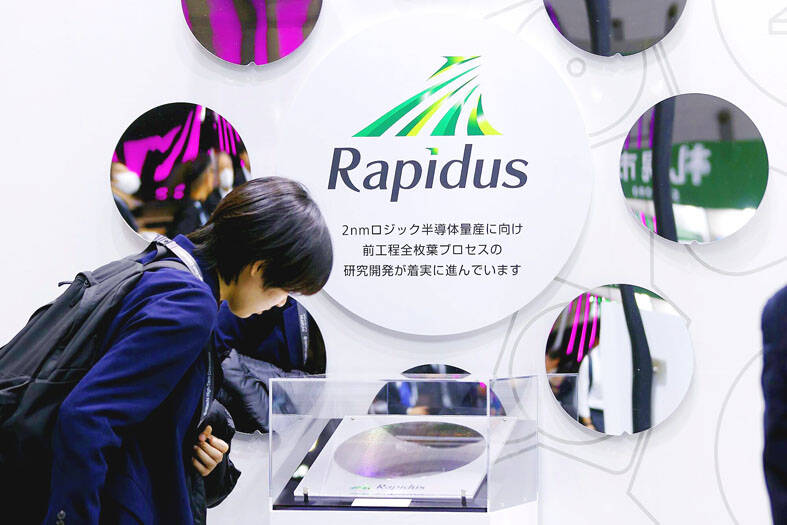Japan’s Rapidus Corp has prototyped an advanced chip, an early step in the government-backed start-up’s attempt to leapfrog years of innovation with the help of billions of dollars of public funding.
The firm last week printed circuitry on wafers using 2-nanometer gate-all-around process technology, Rapidus president Atsuyoshi Koike told reporters yesterday.
He did not disclose the number of functional chips produced.

Photo: Bloomberg
Rapidus, which in April began developing wafers using extreme ultraviolet (EUV) lithography equipment from ASML Holding NV, aims to be ready to help customers with their chips by March next year, Koike said.
The company, which hopes to mass produce cutting-edge semiconductors by 2027, remains far behind industry leader Taiwan Semiconductor Manufacturing Co (TSMC, 台積電), which plans to begin volume production of its 2-nanometer process later this year.
“I don’t think anyone else has been able to succeed at EUV lithography in just three months,” Koike said at a news conference in Chitose on Japan’s northern island of Hokkaido and the site of Rapidus’ factory. “To get to this stage, none of us slept.”
Japan has earmarked more than ¥1.72 trillion (US$11.6 billion) for Rapidus, part of a moonshot bid to manufacture cutting-edge chips at home. The overwhelming majority of the world’s advanced artificial intelligence (AI) chips are manufactured by TSMC, sparking fears about reliance on a nation that China claims as its own.
Critics point to how past Japanese government efforts to help the private sector failed to revive the nation’s leadership — whether in displays, solar panels or memory chips — but uncertainty about US President Donald Trump’s willingness to defend Taiwan in the event of an attack is spurring Japan’s efforts to build its own foundry.
Rapidus has also received funding from local industry leaders such as Toyota Motor Corp and Sony Group Corp.
“The world is astonished by how far we’ve come. Japan’s now taking on cutting-edge technology after lagging behind by more than a decade,” Rapidus chairman Tetsuro Higashi said.
Japanese officials have acknowledged the risks associated with the project.
Tokyo is studying plans to get golden shares with veto powers in exchange for some of the public money it’s promised. The government also is preparing to guarantee Rapidus’ debt, a move that the country’s lenders say is essential for them to lend to a startup that requires billions of dollars in equipment.
Rapidus is developing advanced chipmaking processes with IBM Corp, and has partnerships with the likes of Belgian research hub Interuniversity Microelectronics Center, the University of Tokyo and Japan’s Riken research institute.

Taiwan Semiconductor Manufacturing Co (TSMC, 台積電), the world’s biggest contract chipmaker, booked its first-ever profit from its Arizona subsidiary in the first half of this year, four years after operations began, a company financial statement showed. Wholly owned by TSMC, the Arizona unit contributed NT$4.52 billion (US$150.1 million) in net profit, compared with a loss of NT$4.34 billion a year earlier, the statement showed. The company attributed the turnaround to strong market demand and high factory utilization. The Arizona unit counts Apple Inc, Nvidia Corp and Advanced Micro Devices Inc among its major customers. The firm’s first fab in Arizona began high-volume production

VOTE OF CONFIDENCE: The Japanese company is adding Intel to an investment portfolio that includes artificial intelligence linchpins Nvidia Corp and TSMC Softbank Group Corp agreed to buy US$2 billion of Intel Corp stock, a surprise deal to shore up a struggling US name while boosting its own chip ambitions. The Japanese company, which is adding Intel to an investment portfolio that includes artificial intelligence (AI) linchpins Nvidia Corp and Taiwan Semiconductor Manufacturing Co (TSMC, 台積電), is to pay US$23 a share — a small discount to Intel’s last close. Shares of the US chipmaker, which would issue new stock to Softbank, surged more than 5 percent in after-hours trading. Softbank’s stock fell as much as 5.4 percent on Tuesday in Tokyo, its

The prices of gasoline and diesel at domestic fuel stations are to rise NT$0.1 and NT$0.4 per liter this week respectively, after international crude oil prices rose last week, CPC Corp, Taiwan (台灣中油) and Formosa Petrochemical Corp (台塑石化) announced yesterday. Effective today, gasoline prices at CPC and Formosa stations are to rise to NT$27.3, NT$28.8 and NT$30.8 per liter for 92, 95 and 98-octane unleaded gasoline respectively, the companies said in separate statements. The price of premium diesel is to rise to NT$26.2 per liter at CPC stations and NT$26 at Formosa pumps, they said. The announcements came after international crude oil prices

SETBACK: Apple’s India iPhone push has been disrupted after Foxconn recalled hundreds of Chinese engineers, amid Beijing’s attempts to curb tech transfers Apple Inc assembly partner Hon Hai Precision Industry Co (鴻海精密), also known internationally as Foxconn Technology Group (富士康科技集團), has recalled about 300 Chinese engineers from a factory in India, the latest setback for the iPhone maker’s push to rapidly expand in the country. The extraction of Chinese workers from the factory of Yuzhan Technology (India) Private Ltd, a Hon Hai component unit, in southern Tamil Nadu state, is the second such move in a few months. The company has started flying in Taiwanese engineers to replace staff leaving, people familiar with the matter said, asking not to be named, as the